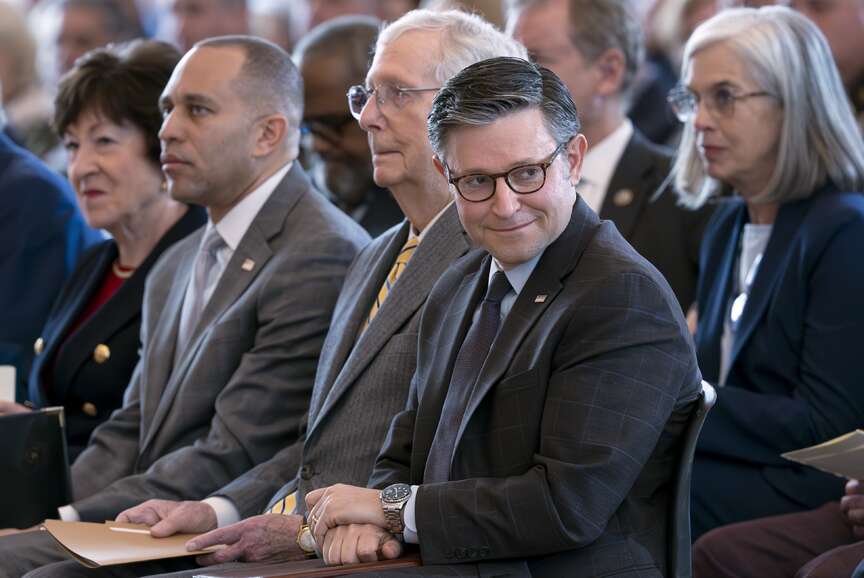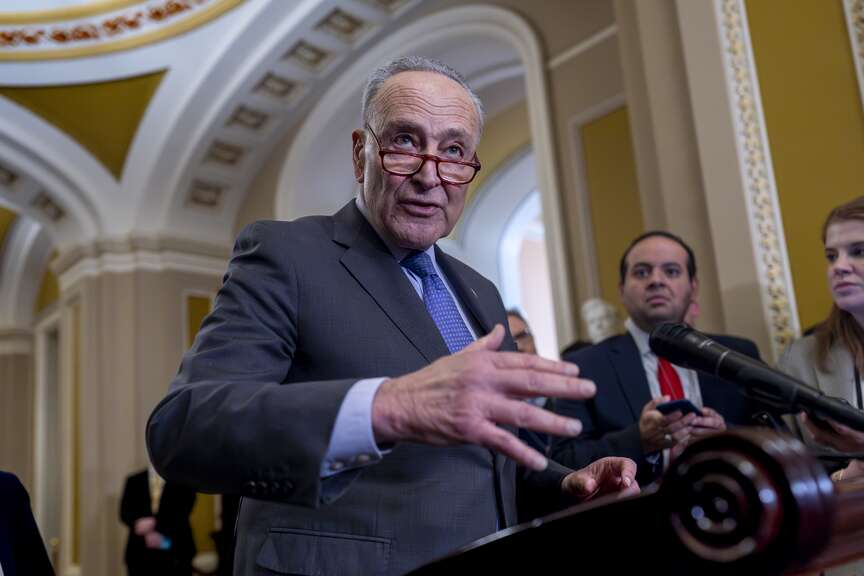WASHINGTON -- Lawmakers introduced a $1.2 trillion spending package Thursday that sets the stage for avoiding a partial government shutdown for several key federal agencies this weekend and allows Congress, nearly six months into the budget year, to complete its work funding the government through September.
Democrats were able to swat back scores of policy mandates and some of the steeper budget cuts that House Republicans were seeking to impose on nondefense programs, though House Speaker Mike Johnson, R-La., highlighted some wins, including a nearly 24% increase in detention beds for migrants awaiting their immigration proceedings or removal from the country.
This year's spending bills were divided into two packages. The first one cleared Congress two weeks ago, just hours before a shutdown deadline for the agencies funded through the bills.
Now Congress is focused on the second, larger package, which includes about $886 billion for the Defense Department, a more than 3% increase from last year's levels. The 1,012-page bill also funds the departments of Homeland Security, Health and Human Services, Labor, and others.
"Congress must now race to pass this package before government funding runs out this Friday," said Senate Majority Leader Charles Schumer, D-N.Y.
The consequences of a brief weekend shutdown would be mostly muted: Many federal workers at unfunded agencies would be off for the weekend anyway. But if a closure goes longer, more than half of IRS employees would face furloughs at the height of tax filing season. Border Patrol officers and about 1.3 million active-duty military service members would remain on the job without pay. So would Transportation Security Administration screeners, many of whom called in sick as a protest after a previous shutdown dragged on for weeks, sparking nationwide travel delays.
Nondefense spending will be relatively flat compared with the prior year, though some agencies, such as the Environmental Protection Agency, are taking a hit, and many agencies will not see their budgets keep up with inflation.
When combining the two packages, discretionary spending for the budget year will come to about $1.66 trillion. That does not include programs such as Social Security and Medicare, and financing the country's rising debt.
"This funding agreement between the White House and congressional leaders is good news that comes in the nick of time: When passed it will extinguish any more shutdown threats for the rest of the fiscal year, it will avoid the scythe of budget sequestration, and it will keep the government open without cuts or poison pill riders," Schumer said Thursday on the Senate floor. "It is now the job of the House Republican leadership to move this package ASAP."
The House is expected to take the measure up first today. House Majority Leader Steve Scalise, R-La., urged Republicans to vote for the measure, noting that more than 70% of the spending goes to defense.
"At at time when the world's on fire, more than ever, we need to make sure that we are properly funding our nation's defense and supporting our troops," Scalise said.
Then it would move to the Senate where senators would have to agree on taking it up expeditiously to avoid a partial shutdown. Usually, such agreements include votes on proposed amendments to the bill.
Sens. Rand Paul, R-Ky., Mike Lee, R-Utah, and Bill Hagerty, R-Tenn., have already signaled they are likely to offer amendments and attempt to slow the Senate's consideration of the bill. If the upper chamber cannot reach unanimous consent on how much time to spend on those amendments before a vote today, Schumer would probably have to tee up a vote for Sunday or even Monday instead, because of Senate procedural rules.
Congressional staffers were up until 3 a.m. Thursday preparing legislation for this new tranche of bills. Johnson is bucking the House's rules to enable a quick-fire vote, further enraging the House Freedom Caucus on the right flank of the GOP conference, which is already raising the alarm over spending levels.
"Speakers, plural, don't seem to be able to get it right," Rep. Byron Donalds, R-Fla., one of the group's leading spending hawks, said Thursday. "I think they get caught up with the process games of this place, especially with the Senate, and even with members in both parties. And that's not what our country needs. Our country needs our speakers to actually lead and make the hard decisions and do things that are going to be tough in this town. But when you travel the country people are going to say, 'Thank you for doing what was necessary.' Everybody here assumes it's always the end of the world. We got a lot of Chicken Little syndrome happens in Washington, D.C."
Other Republicans more in line with Johnson, some still bruised from a lack of political success on earlier funding bills, celebrated conservative policy wins and spending cuts in the legislation.
Johnson described the bill as a serious commitment to strengthening national defense while expanding support for those serving in the military. The bill provides for a 5.2% pay increase for service members.
GAZA FUNDS CUT OFF
In promoting the bill, Republicans cited several ways it would help Israel. Most notably, they highlighted a prohibition on funding through March 2025 for the U.N. Relief and Works Agency, which is the main supplier of food, water and shelter to civilians in Gaza.
Republicans are insisting on cutting off funding to the agency after Israel alleged that a dozen employees of the agency were involved in the attack that Hamas conducted in Israel on Oct. 7.
But the prohibition does concern some lawmakers because many relief agencies say there is no way to replace its ability to deliver the humanitarian assistance that the United States and others are trying to send to Gaza, where one-quarter of the 2.3 million residents are starving.
Democrats emphasized that humanitarian assistance will increase globally though, by about $336.4 million.
Sen. Patty Murray, D-Wash., the chair of the Senate Appropriations Committee, also highlighted a $1 billion increase for Head Start programs and new child care centers for military families. Democrats also played up a $120 million increase in funding for cancer research and a $100 million increase for Alzheimer's research.
The legislation also secures $1 billion for climate resilience funding at the Defense Department and provides an additional 12,000 special immigrant visas for Afghans who assisted the U.S. military and are attempting to escape the Taliban government.
"We defeated outlandish cuts that would have been a gut punch for American families and our economy," said Murray.
She also said Democrats successfully fought off numerous policy measures, known as riders, that House Republicans were seeking to add that Democrats said would have gone after LGBTQ+ rights and abortion access.
"From Day 1 of this process, I said there would be no extreme, far-right riders to restrict women's reproductive freedoms -- and there aren't," she said.
Among the policy provisions that House Republicans did secure was a requirement that only allows for the American flag and "other official flags" to fly over U.S. diplomatic facilities. Under the Biden administration, U.S. embassies have been invited to fly the Pride flag or light up with rainbow colors in support of the LGBTQ+ community.
The spending in the bill largely tracks with an agreement that former Speaker Kevin McCarthy worked out with the White House in May 2023, which restricted spending for two years and suspended the debt ceiling into January 2025 so the federal government could continue paying its bills.
Shalanda Young, director of the White House Office of Management and Budget, told lawmakers Thursday that last year's agreement, which became the Fiscal Responsibility Act, will save taxpayers about $1 trillion over the coming decade.
McCarthy, R-Calif., was ousted from the speaker's role a few months after securing the debt ceiling deal. Eight Republicans ended up joining with Democrats in removing McCarthy as speaker. And some of those unhappy with that deal also expressed misgivings about the latest package.
"I hope there will be some modest wins. Unfortunately, I don't expect that we will get much in the way of significant policy wins based on past history and based on our unwillingness to use any kind of leverage to force policy wins, meaning a willingness to walk away and say no," said Rep. Bob Good, R-Va.
Work on the spending bills has been more bipartisan in the Senate. Murray issued a joint statement after the bill's release with Sen. Susan Collins, R-Maine, urging colleagues to vote for it.
"There is zero need for a shutdown or chaos -- and members of Congress should waste no time in passing these six bills, which will greatly benefit every state in America and reflect important priorities of many senators," Murray and Collins said.
Johnson said that after the spending package passes, the House would next turn its attention to a bill that focuses on aiding Ukraine and Israel, though lawmakers are scheduled to be away from Washington for the next two weeks. The Senate has already approved a $95.3 billion aid package for Ukraine, Israel and Taiwan, but Johnson has declined to bring that up for a vote.
Information for this article was contributed by Kevin Freking of The Associated Press and by Jacob Bogage of The Washington Post.
 Speaker of the House Mike Johnson, R-La., front row right, is joined by, from left, Sen. Susan Collins, R-Maine, House Minority Leader Hakeem Jeffries, D-N.Y., and Senate Minority Leader Mitch McConnell, R-Ky., as they attend a Congressional Gold Medal ceremony for surviving members of a top-secret WWII unit, at the Capitol in Washington, Thursday, March 21, 2024. (AP Photo/J. Scott Applewhite)
Speaker of the House Mike Johnson, R-La., front row right, is joined by, from left, Sen. Susan Collins, R-Maine, House Minority Leader Hakeem Jeffries, D-N.Y., and Senate Minority Leader Mitch McConnell, R-Ky., as they attend a Congressional Gold Medal ceremony for surviving members of a top-secret WWII unit, at the Capitol in Washington, Thursday, March 21, 2024. (AP Photo/J. Scott Applewhite)

